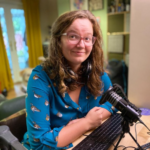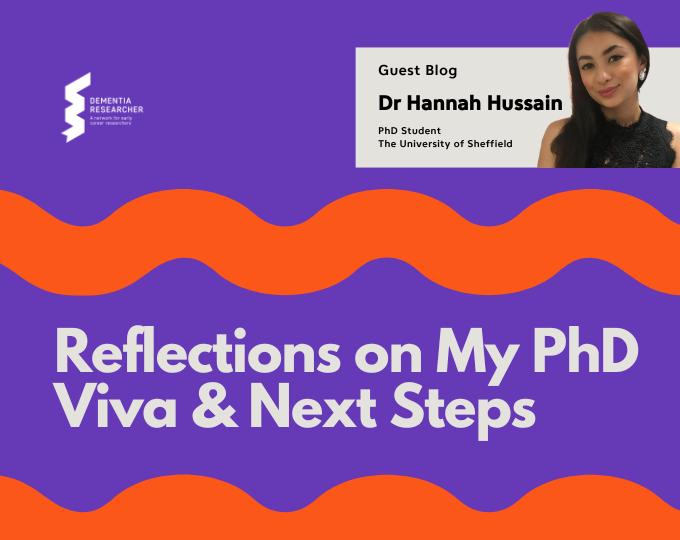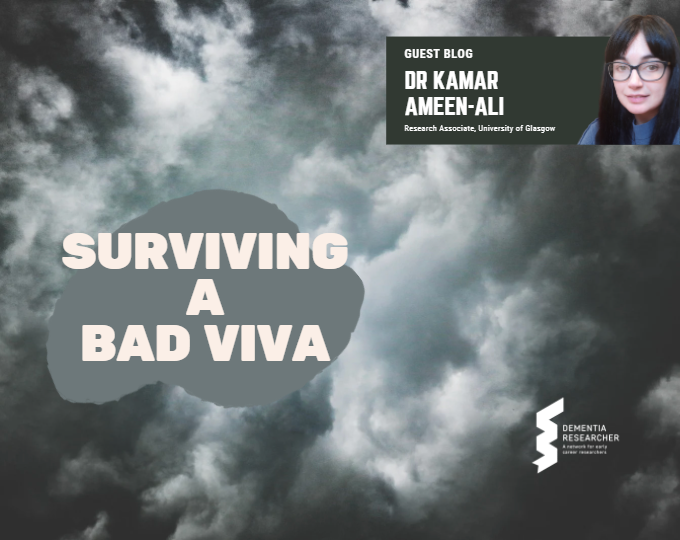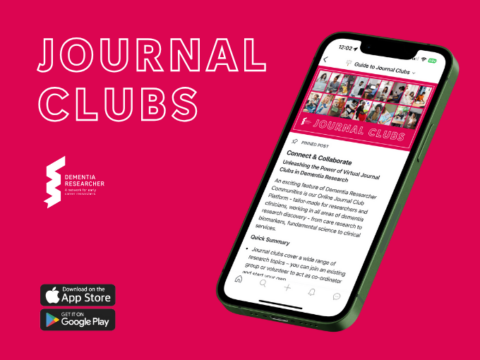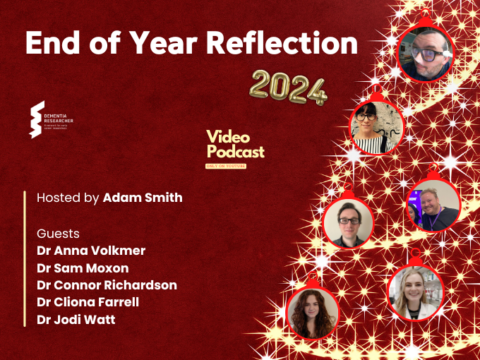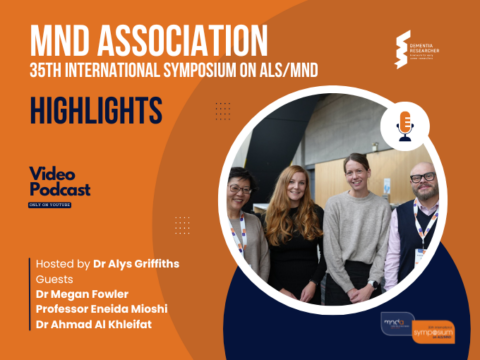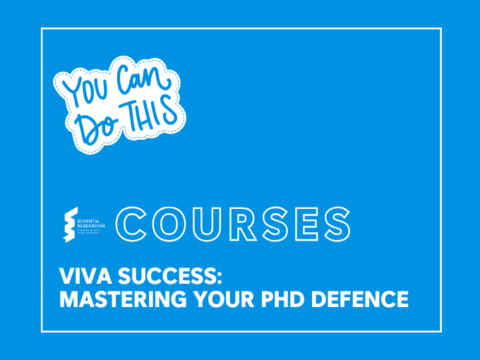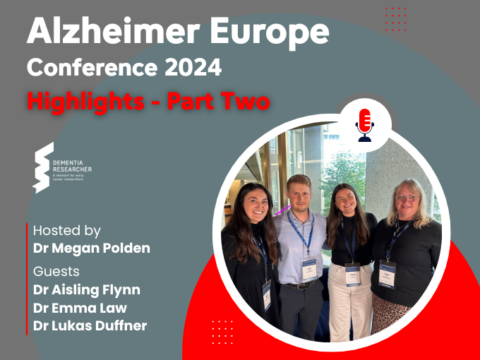In this episode of the Dementia Researcher Podcast, Dr Leah Fullegar discusses the PhD viva experience with three recent graduates who share their insights into the preparation and execution of their defences.
Join us to learn from the experiences of Dr Hannah Hussain, Dr Aisling Flynn, and Shalom Henderson, who bring diverse perspectives from their respective fields. Each guest shares valuable insights into the preparation techniques that aided them, as well as reflections on their personal experiences of the viva.
For anyone approaching their PhD defence or interested in understanding more about this crucial academic challenge, this podcast provides a comprehensive overview and practical advice.
Listen for:
- Expert Advice: Hear firsthand from those who've recently navigated their vivas, providing invaluable insights and tips tailored to succeeding in this critical academic challenge.
- Preparation Strategies: Learn effective strategies and practical steps for preparing for your viva, helping to boost your confidence and readiness.
- Real Experiences: Gain perspective from a diverse panel of recent PhD graduates who share their personal experiences, challenges faced, and how they overcame them.
- Empowerment: The episode offers encouragement and motivation, showing that success is achievable and that you can handle your viva with assurance.
- Community Support: Discover resources and support available through the Dementia Researcher community, enhancing your preparation journey and connecting you with a network of peers and experts.
Voice Over:
The Dementia Researcher Podcast, talking careers, research conference highlights, and so much more.
Dr Leah Fullegar:
Hello, everyone. Welcome back to the Dementia Researcher Podcast. Today we'll be revisiting a topic that hasn't been discussed on this show for quite some time, and it's the PhD viva.
I am Dr. Leah Fullegar, and I'm a research associate at the University of Portsmouth. I defended my PhD back, way back, in 2023. I really enjoyed my viva, but I had a conversation with my friend at the time and she was absolutely traumatised by hers. When I said that I was doing this podcast today, she just said, "Why on earth would you do that? That's just reliving trauma." So, she won't be listening, I don't think. But I'm excited to reflect because I had a really lovely experience, and I want everyone to know that you can have a lovely experience. As ever. I'm joined by a brilliant panel of guests who have all themselves recently defended and gone through the viva.
In this show, we're going to learn a little bit more about their experiences, how they prepared, what they wish they'd done differently, what helped, what didn't, and hopefully by the end of the show we will have provided a few tips and some funny anecdotes, potentially, that might help you when the time comes. So, joining me today, we have Dr. Hannah Hussain, Dr. Aisling Flynn, and new Dr. Shalom Henderson. Before we get into it, I'd love to hear a little bit about your research and each of you and what you're working on at the moment. First, if I pass over to Dr. Aisling Flynn, could you tell me a little bit about yourself and your research?
Dr Aisling Flynn:
Yeah, hi everyone. I'm really happy to be here. My name is Aisling Flynn. I am a PhD, actually, not a PhD student or researcher anymore. It's a force of habit. Perfect example of what happens post PhD. I'm a lecturer in occupational therapy in Bournemouth University, and I defended my PhD earlier this year in May, so not that long ago. And actually, I had a really, really lovely viva experience, which was quite unexpected, so I'm looking forward to sharing that. My research is very much focused on dementia and digital technology, so my PhD was focused on the design of a virtual reality application for people living with dementia in order to promote their social connectedness.
Dr Leah Fullegar:
Fantastic. That was a proper, like, still a PhD student, haven't quite got past that feeling yet. And Dr. Shalom, can you tell me a bit about what you're doing, where you're working, what your research is about?
Shalom Henderson:
Sure. Hi, everyone. I'm Shalom Henderson. I go by my nickname Shaz and I'm a newly minted PhD because I had my viva two weeks ago. I am at the University of Cambridge. I'm also a speech language pathologist by background, so I've been working with patients with frontotemporal lower degeneration and related disorders like Alzheimer's disease in the last seven years. My research has been largely focused on two broad aims, firstly to address the barriers to the assessment of progressive aphasias and secondly to improve clinical characterization of Alzheimer's disease phenotypes, really considering its full clinical spectrum, including disease severity. I'm really excited to be in this podcast today. Also, my time as a PhD student is coming to an end and I look forward to the conversations.
Dr Leah Fullegar:
Brilliant. It's really good to see speech and language therapy, occupational therapy being represented. That's just my little excited in the background. Next, Dr. Hannah Hussain, can you tell me a bit about you and your research?
Dr Hannah Hussain:
Yeah, sure. My name's Hannah Hussein. I'm really excited to be here today and on this podcast call. My research is I'm a health economist by background under a pharmacist, so I've kind of got the clinical experience as well, but my research was looking at measuring health-related quality of life in dementia populations, specifically for use in economic evaluations. I focus on the challenges related to self and proxy assessment and worked on a methodology that would enable us to integrate both self reports and proxy reports in a kind of robust manner, acknowledging that both sources of report are really informative and important and could provide a more accurate reflection of health-related quality of life in economic evaluations and help us to prove that some wonderful interventions are cost-effective. Yeah, that's a bit about me and my PhD. I'm currently working as an economist at the OHE, the Office of Health Economics, in London, and my viva was in June, so not that long ago, but it feels like so long ago now.
Dr Leah Fullegar:
Fantastic. I am really pleased that we've got a pharmacist here as well. I love the idea of being a pharmacist. I think in another life I would be a pharmacist.
Thinking about preparation stuff. When I was preparing for my viva, I had absolutely no idea where to start, and I was kind of jumping around all over the place trying to think what I need to do to prepare. So, I suppose the first question I would have to ask is, is there any one thing you did to prepare that really helped you before the viva. Shaz, if we start with you.
Shalom Henderson:
Sure. Yes. I know that the podcast listeners won't be able to see, but I have my soft-bound copy here for you to see. I printed this copy, and as you'll see, it's colour-coded, it has post it notes. I found it really helpful to mark areas that I found to be important, beginning of chapters or abstracts, important figures or places where I knew that the examiners might ask questions about methodological concerns or details. So, reading through my thesis, of course, was important, but marking it with notes I found to be really incredibly helpful.
My supervisors gave me a lot of helpful comments and suggestions as well. Just to mention a few, they really reminded me that the examiners most likely would've read my thesis once, so it's a huge memory load for them. So, it's okay to walk them through concept or a theory aspect or a figure. So, I actually prepared a brief summary of each chapters as well as kind of rehearse, not like a script, but rehearse how I would walk someone through a complicated figure.
Dr Leah Fullegar:
That's really interesting because one of the pieces of advice one of my supervisors gave me was about having a script that you could fall back on when there was something, if someone asked you a difficult question or you just needed time to think, Hannah, was your experience similar? Did you do the post it notes and everything with your thesis?
Dr Hannah Hussain:
Yeah, absolutely. I was going to say the exact same thing, having a printed copy of your thesis. Because I think one of the things that you might neglect or not realise is you can take what you want in there with you, so it's your work and that's okay. You're not cheating by taking your own thesis into a viva. So, I did the exact same thing. My copies under my laptop stand, so I'm not going to whip it out, but I had the exact same as you with the post its and the colour coding and everything else.
The other thing that really helped me in my preparation was I had a mock viva, and actually I was really lucky because my supervisors arranged this with other people within the faculty, so it felt a little bit more real that they weren't my actual supervisors that I spoke to every day for three years. They kind of fielded loads of questions to them to ask to me to make it feel a little bit more like an actual viva. And I had that two weeks before the viva, so the initial nerves were gone. I was actually more nervous for my mock. And I felt like that was a really good experience and a really good thing to do, and I would definitely recommend that to everyone else if they can access that.
Dr Leah Fullegar:
That's really interesting because one of my later questions I'll ask momentarily was about nerves, and it's interesting that that kind of helped manage those nerves and delay them a bit, I suppose, or not delay them, replace them.
Dr Hannah Hussain:
Yeah.
Dr Leah Fullegar:
Aisling, how did you find preparation? Was there anything you particularly did?
Dr Aisling Flynn:
Yeah, similar to the others, very much I would've scribbled all over that printed out thesis and had the margins filled with different things that I wanted to touch on within the viva. Also, I found it really useful to have an overview of each chapter. So, I did a bullet-pointed list of the main points within each chapter and had that put in at the front of each chapter, then, with a paper clip so I could refer to that during the viva.
I also like that I had two mock vivas, which I thought were invaluable, actually, in terms of settling those nerves and just practising saying your questions out loud. I guess something that hasn't been touched on. I bought a pack of viva cards, they're called, which have loads of common questions that come up in the viva around, "Tell me about the aims of your research. What is the contribution to knowledge?" So, all those kinds of common questions that come up. And I would just pull a card from the deck and then say it out loud or get a family member to pick a card and then I had to answer it. So that constant repetition, and I thought that was really, really helpful for me as well.
Dr Leah Fullegar:
Yeah, that's kind of building a muscle memory for question answers as well, isn't it? Just having someone throw questions at you while you are cooking in an evening. "What are the main aims of your research?" And being able to spew something out on command. On nerves, on the day of, were you feeling nervous? Were you feeling confident? Aisling, I'll stick with you for a minute. How were you feeling on the morning?
Dr Aisling Flynn:
The morning of I was quite nervous, actually. I couldn't eat at all. I was really, really nervous before I went in. And actually, the second that I went in there and started talking and was introduced to the panel, my nerves kind of just dissipated, to be honest, and you get into kind a sense of flow in terms of just answering the questions. And the time actually flew. So, I think once I was in there and stepped inside the room, those nerves just went, thankfully.
Dr Leah Fullegar:
That's a good thing about, I was really lucky that my viva was in the morning, so I didn't have much time to have the nerves build up. It's just a quick question. Did you all have morning vivas?
Dr Aisling Flynn:
Yeah.
Dr Leah Fullegar:
No, Shalom. Was yours later in the day?
Shalom Henderson:
Mine was at 2:00. 2:00PM.
Dr Leah Fullegar:
Do you think that impacted how you felt on the day?
Shalom Henderson:
I think so. I'm more of a morning person. My viva was also three hours long. At some point I felt fatigued from cognitive overload. So, I think it did impact how I did on my viva overall in terms of just energy and having consistent enthusiasm during the discussions.
But in terms of nerves, have a lot of friends. I'm very grateful to have a lot of friends who have gone through this process already, and one of my dearest and closest friends, Dr. Sandison, just to give her a shout-out, she gave me really good advice a couple of days before my viva. She said that it's good to be reminded that in addition to your supervisory team, there are most likely only two people who will devote so much time and dedication and attention to your research work, and they're your examiners. And that really instilled in me that this is such a privilege that these two people are going out of their way, making time to read it, comment, and give constructive feedback. So, I think what that did to me had put me at ease and I felt really grateful on the day of. I was able to have lunch with my colleagues before the viva, and I think I went in there not only grateful, but also confident knowing that this is my work. I am the expert in my own work. So those two feelings I think really stayed throughout my viva.
Dr Leah Fullegar:
That's really lovely to hear, and I think that's a common theme a lot of the time in people when they're talking about their vivas is the sense of ownership and knowing this is your work and you are the expert in that as the conversation goes on. Hannah, how did you find your nerves and everything on the day?
Dr Hannah Hussain:
Yeah, I was really nervous going in, and although the nerves did settle, they kind of peaked and trough throughout the viva. Mine was also really long, two-and-a-half hours. And I think that the thing that was making me more nervous as I was going was that my examiners weren't really letting on whether or not I was answering their question. So, they'd ask me a question, I'd be like, "Yeah, okay," And then, "Does that answer your question? Is that what you were looking for?" And then they'd just be like, "Yes." Very stone-faced. And I'm like, "I don't know if I'm doing this right or not." We had a comfort break in the middle because it was so long. And then my examiners said that this kind of standard thing, we need to have a discussion, and we'll come back to you, and we'll let you know. We'll come grab you.
I went to wait in my supervisor's office, and they said not longer than 10 minutes. 10 minutes went by, another 10 minutes went by, another 10 minutes went by, and I was absolutely the most nervous wreck ever, especially because my supervisor was Googling, "What's the difference between minor and major corrections?" And I was like, "Ah!" Which was really tough. But in the end, my internal and external examiner were just trying to get their notes written up whilst they were together in person on the day, and they'd made the decision pretty soon, which was fine. But yeah, that really added to the nerves.
I think it's just one of those days. It is a big thing. You've dedicated so much time and effort and energy to this piece of work where you've led the entire project, for me it was three-and-a-half years, which is going to be a nerve-wracking experience. I don't think it would be normal for it not to be. But if you're prepared and your stuff, you can just keep telling yourself that you're doing your best and no one else can do this better than you. So yeah, it was nerve-wracking, but it was rewarding too.
Dr Leah Fullegar:
The thing I picked up on what you were just saying is about how when you are going into the viva and it's the end of this sort of massive journey of research that you've been heavily involved in for God knows how long depending on all the things that happened throughout. And one of the things I found, and I know this probably goes slightly beyond preparing for your viva, was that actually how much it didn't feel like the end. So, I had modest corrections, which was a bit more than minor, and it felt I came out with that vibe of feeling really like, "So it's not over." I don't know if anyone else had a similar experience.
Dr Hannah Hussain:
Absolutely. I had the same feeling, mainly because, I don't know, it must vary between academic institutions, but there was just so much admin for me after as well. We have to make our theses accessible on the White Rose repository. So that was further admin, and I was trying to submit a paper at the same time and get that tied off and it didn't finish when it finished. It was a relief, and you could breathe, but you knew there was still more to come. So yeah, that feeling resonates with me.
Dr Leah Fullegar:
Shaz and Aisling, you're both nodding.
Shalom Henderson:
Yeah, I think that PhD is a process, and the end is unclear. I felt that the submission itself was very anticlimactic, so I was really writing up for three months intensively and then I submitted, and it was just a click of a button. I got an email that said, "Thank you for completing your assignment," And it reminded me of being in primary school, whereas I've spent four years of my time really working on various projects to make it a thesis that I'm quite proud of. So, the thesis submission, I think, was a bit more anticlimactic than the viva. So, after the viva I felt more like, "Okay, this is the end. I just have to do some minor corrections and then that'll be it." I think in my case, because I'm moving back to the US, there is a concrete next step. So maybe that's why it kind of feels like I'm done at this moment, but that feeling definitely resonates with me as well.
Dr Aisling Flynn:
Yeah, I would say similar. I had minor corrections, but actually when I went to look at it at the time, it still takes quite a bit of time to sit down and do that. But also, at the point where you have your viva and then you're doing those corrections, oftentimes you are in full-time work and you're doing it on an afternoon or whenever you get time in the evening. So, you don't have that protected time that you have during your PhD to actually sit down and do that, so it's actually trying to fit that time in within the time that you're given as well. And yeah, I agree with Hannah, that admin, it does take up quite a bit of time in order to get things uploaded on repositories or put an embargo if something is being published and you want to publish it open access. So, there's quite a lot of admin and hoops to jump through, I guess.
Dr Leah Fullegar:
One thing that my husband was very pleased about with all of the anti-climactic finishes that weren't really finishes was like, "Well, there's just so many opportunities to celebrate. We can celebrate after the viva. We can celebrate when the final thesis is submitted. We can celebrate at the graduation. We've got all those opportunities." He's an optimist.
Shalom Henderson:
Very true.
Dr Hannah Hussain:
I love that, though.
Dr Leah Fullegar:
I'm jumping back it to the actual viva and that. One of the things I was really conscious of was what to wear. My viva was online, and I was very conscious that I had to look professional and smart and things like that. And as you can probably tell, I think I'm the scruffiest person here, so it's an effort for me to look professional. Did you feel the same? Did you panic about what to wear and how to present yourself?
Dr Aisling Flynn:
I definitely did. I talked quite a bit about it actually. I think it was mainly because I was procrastinating over actually doing viva-related prep. It was something I talked quite a lot about. I remember having a conversation with my supervisor asking what to wear and getting her advice, and she actually laughed back at me and just said, "Whatever you are comfortable in because it's your viva," Obviously within reason. But the main thing is that you are comfortable on the day. Ideally wear layers, so if the room is too warm, you can take your cardigan off or you can put the cardigan on. So, it's just to, I guess, have those layers if you need them. Mine was during, as I said, May, so a little bit unpredictable in terms of what the weather can do, particularly in Ireland. But yeah, I think comfort is key, really. I just ended up going with smart trousers and a long-sleeved top. So again, just something quite casual, really. Smart casual, I would say.
Shalom Henderson:
I was exactly the same. Smart casual. I get cold very easily and the weather is, like you say, very unpredictable. Mine was in November, and sometimes the heater is on, sometimes it's not. So, I had a long sleeve, some just dress pants that I would wear to work or when working with patients, and I also had a blazer that was easy to take off, so I ended up taking it off when it did get a little warm.
Dr Hannah Hussain:
Yeah, pretty much the same for me. A blazer and some pants and a shirt underneath. I think that, yeah, I agree. You want to go smart casual, but when you've been remotely doing your PhD, like how I did, and started in COVID, you were used to the sweatpants life. So, I was like, "I'm not going to sit in a non-elasticated waistband for two-and-a-half hours and be thinking about that the entire time." So yeah, it was definitely smart casual. But yeah, I agree layers and things, it's important to be comfortable.
Dr Leah Fullegar:
There's a question that I hadn't actually considered until I saw it on one of the things to talk about in this podcast today, and it's how do you feel about being an examiner? Are you looking forward to being an examiner for someone else's PhD and someone else's viva? I hadn't even thought about that really. I don't know how you feel about that.
Shalom Henderson:
I haven't really thought about it, but I would definitely like to in the future, hopefully one day. I think it is an honour because it means that you are somewhat of an expert in someone's field and they're also trusting you, the institute, as well as the supervisors are trusting you to do a fair job in really giving constructive feedback as well as suggestions and comments to the student and make the decision of whether that person passes. So, I think there's weight that comes with it, but it's also a huge honour and a privilege. I would like to one day, but I'm just fresh out of a PhD, so I think I have a long ways to go before that happens.
Dr Aisling Flynn:
Yeah, I think, once you've done your viva, it's something that I guess I haven't even thought about because I still feel like a student, clearly from the beginning when I introduce myself as a one. But yeah, I think in terms of my viva experience, it was not what I imagined whatsoever. It was really, really lovely and I never thought that I actually would've had that experience. Even though everyone reassures you, I still thought that I was going to go in there and get absolutely grilled, which wasn't the case. I had just two really lovely examiners and I think that experience has shown me how I would like to be as an examiner in terms of putting somebody at ease and not having that power imbalance, actually, which is really important. That my examiners really just saw me as a researcher and saw the merit in my work, which was really lovely. So, I think that's something that I'll definitely take with me if I do have the privilege of being an examiner down the line.
Dr Leah Fullegar:
It's a lovely way to think of it, especially, I agree with you. My viva experience was really lovely and supportive, and I would like to take that forward if I was ever to be an examiner for someone else. Hannah, how do you feel about it?
Dr Hannah Hussain:
I think it's a little bit of a weird one for me because I've kind of left academia. The role that I'm in is kind of half academic, half consulting, so nothing that I'm doing is strictly academic. I still have my foot in that door and have submitted some grants for funded research and stuff because I like the research side of things, but I'm trying to put myself back into an academic mind space and think about how I would deal with it. But it just feels really weird not being affiliated with a university or an institution.
I think I would find it really valuable, especially if it was a topic that aligned with my research and my research interests, particularly in dementia research and health economics. It's a really interesting field and there's so many loose ends. So, to be able to see a new researcher come through with some budding ideas, I think it would be really valuable. I do wonder how they get through the whole PhD thesis and how I would do it. Would I read it in chunks? Would I read it in one go? I do wonder how I would do that. But yeah, I think I would definitely be up for it if someone nominated me as their examiner,
Dr Leah Fullegar:
We should totally get another podcast panel together of examiners and talk about how they do it. One of my colleagues was saying that she'd set a day aside to read a thesis, and that's a lot of concentration to read it all in one day. I don't know if I could do that.
Is there anything you wish had been different about your viva? And that can sometimes be a little bit of a difficult thing to talk about, I think, because I can't really articulate why, but I think it can be a little bit different. I think in my viva, I wish I'd been a little bit more confident and a bit more confident in myself in the outcome at the time. Shaz, as the most recent, I'll see, do you feel like you could have done anything differently?
Shalom Henderson:
Yeah, I think in terms of preparation, I like to be organised, and I have a type-A personality, so I think that I really planned ahead leading up to the viva. But even with that, it was crunching time, and it was very stressful. I also have a toddler at home, so there were a lot of unforeseen circumstances like illnesses, and I had to stay home certain days where I thought I would be working. So, if I could go back, I think I would give myself a bit more time to write up. Initially I thought three months would be great, but maybe four months or five months so that I wouldn't be working over weekends or working late at night.
But in terms of the viva and on the day, because my viva was three hours long, my internal examiner actually suggested doing a little break, and I used that break to run to the toilet and I came right back. But in hindsight, I think it would've been really nice to actually stretch, go for a cup of tea, and maybe a five-minute walk to just get some fresh air. Because as I mentioned previously, it was very cognitively taxing. So, I think having a break or having some tea as you're thinking, it's quite helpful.
Dr Leah Fullegar:
Yeah, just doing something a bit different to put a break in it, I suppose, and stop thinking about it for 10, 15 minutes is probably quite a nice relaxing thing to do. Hannah, is there anything you wish had been different or done differently about your viva?
Dr Hannah Hussain:
Yeah, for sure. I enjoyed the viva. It was tough but fair. My examiners were amazing, and I went for lunch with them straight after. It was a really rewarding experience. But the one thing that I didn't do was give myself enough time off after it. Like Shaz said, it's so cognitively draining. You actually don't realise until you get out of it how burnt out you are. I was just so tired and then had a job interview the next day and then flew out to meet my in-laws for the first time two days later and had one day to pack and then came back and basically started my job. So, I just didn't give myself any time to just kind of simmer in the reality that I'd just done a viva and it's like a massive achievement. So, I wish I'd done that. I wish I could go back and give myself a little bit more time to just decompress and do nothing and just enjoy doing nothing for a bit. But yeah, I would just advise that to people going forward.
Dr Leah Fullegar:
Don't organise all of the most stressful things in your life to happen all within a few days of each other.
Dr Hannah Hussain:
Exactly. Yeah.
Dr Leah Fullegar:
Yeah, that really sounds like a really exhausting week. Aisling, is there anything you would add to that or anything you would do differently?
Dr Aisling Flynn:
Yeah, I absolutely agree with Hannah in terms of giving yourself that time, which I don't think I fully did either. I celebrated the night of my viva, but actually after that you just go back into work and you actually forget that that even happened, which it's a really strange feeling.
But actually, for the viva itself, while mine was actually a really positive experience, it only lasted about an hour-and-20 minutes, so it was really quick. So, I was really fortunate with that. But my external examiner was online and my internal was in the room, so we had kind of a hybrid approach. And while it actually did work well, I think it would've been really nice to have that experience and actually meet that external examiner because she was somebody that I really looked up to in terms of her research and her work. But just in terms of she's based in Australia, so just wasn't feasible. So, I think if I was to do anything differently, it would be to have all of us in the room physically present because I think you get a lot more from the conversation when everyone is there face-to-face.
Dr Leah Fullegar:
I feel the same. I think having that face-to-face interaction makes it feel a bit more real and a bit better, I think. I'll make this my last sort of official question, but one of the tips that I was given before my viva, I suppose, was that when you're going into the viva, you're not going into it as a student, you're going into it as a colleague and as a fellow researcher. And that actually really changed how I felt about it is going in because I didn't feel like I was a student trying to prove something or pass an exam; I felt like I was going in as a researcher to talk about my research. Is there any one thing that anyone said to you before your viva or since your viva, even, that really helped how you think about it?
Dr Aisling Flynn:
I think, for me, my supervisor, before I went into my viva, basically just reiterated the fact that I had pretty much every chapter in my thesis published and the fact that that had been already peer reviewed and there was very little that my examiners could dispute because that work had been published in international peer-reviewed journals that had a decent impact factor. So, I think that was definitely something that helped. Knowing that those papers had already gone through that process and it was something that you could discuss within the viva. But also, I worked really closely with the public and patient involvement group throughout my research, and they were really great in just telling me basically how great my research was when I didn't think it was great and telling me that my viva would be fine and that I will get through it. And I think having their perspective was actually really lovely and really reassuring going into my viva as well.
Dr Leah Fullegar:
Having your own little cheerleader squad sort of cheering you on.
Dr Aisling Flynn:
Yeah, I really needed it and hated the thesis. I couldn't even bring myself to open it. So, I think, yeah, having that support was really lovely, actually.
Dr Leah Fullegar:
Excellent. Shaz, is there anything?
Shalom Henderson:
I think I had three consistent advice from multiple people, my supervisors, mentors, colleagues, friends. The first thing was, "Just be yourself." And at the time I said, "Oh, what do they mean just be myself?" But I really was myself and I was able to engage in conversations like colleagues, which is really good. The second thing was, I forgot.
But the third thing was don't be afraid to ask questions or to have discussions. And I think that was really helpful to hear because initially I thought of the viva as an exam or maybe you're being tested, but actually, it's not. I had a lovely experience with both my examiners. They treated me with so much respect as a colleague, a potential collaborator, and there were moments where I asked a question out of genuine interest or there were times where I didn't quite understand, and I wasn't afraid to ask them for clarification. I think that kind of back-and-forth really created a safe space where I felt that my opinion and my knowledge were valued and that we could interact and exchange ideas collaboratively. So, it was an overall very positive experience as well as good advice from other people.
Dr Hannah Hussain:
I kind of had one stand-out piece of advice that was given to me or kind of a compliment that was given to me following my confirmation review, which is your first year of viva, that I always carried forward and really helped me when it came to my viva, which was that a strong researcher is one that admits their limitations and can say when they don't know. My primary supervisor, he just said to me, "You're really good at just saying you don't know, and that's okay. You don't waffle. If you don't know the answer, you're not perfect. There's going to be things you don't know. So just say that. It comes across so much better than trying to blag it or trying to say that you've considered something when you've not. There are limitations to everyone's research. As long as you're transparent and you acknowledge them, and we do at the end of every single chapter, it's okay to say that and reiterate that in the way that you talk and defend your work." Yeah.
Dr Leah Fullegar:
Yeah, I think that's a really important thing to remember because there's often this pressure to always have an answer and always have something to say and being able to say, "I don't know," Is quite a brave and important skill to have.
Okay, so we're almost out of time. I will do one final question just for fun. And I haven't thought about this at all, so I don't know what my answer would be. So, I'm going to let you all answer first. If your PhD viva had a theme song, what do you think it would be and why? I'm looking at some very blank faces for a minute. I'm going to pick on someone. Aisling, how did I know you?
Dr Aisling Flynn:
How did I know you would pick me. This really threw me, this question, and I could not think of something. And then eventually something came to me before we started the podcast, actually. I don't usually listen to Bob Marley, but I think Bob Marley "Three Little Birds", "Every little thing's going to be all right. Don't worry about a thing." I actually think that song will probably be the theme tune to my viva.
Dr Leah Fullegar:
That's really lovely, actually, that one. Hannah, you've spoken next, so I'm putting you on the spot next.
Dr Hannah Hussain:
The first song that came to mind was Daniel Bedingfield "Gotta Get Thru This". Because I was sat there for two-and-a-half hours with the clock directly above my examiners, like, "Just need to get through. As long as I get through, I'll be fine." So yeah, it would have to be that song. I'm sorry, but it has to be.
Dr Leah Fullegar:
That's a perfect song for a viva theme tune, I think. Shaz, what would yours be?
Shalom Henderson:
This is a really hard question, and just reflecting on my PhD, I had a baby in my second year, so a lot of my PhD has been finishing as well as trying to survive first time motherhood, and my son really loves Moana, and there is a song "How Far I'll Go". I think it really speaks to me because it's finding your way around the world, and it speaks to you being strong and being independent. There is a lot of uncertainty in academia and what my future will look like while I'm being optimistic. I think this song would be my choice.
Dr Leah Fullegar:
I still don't have one, I don't think. I don't know. I can't think of a song that would be a theme tune for my viva. It would be probably something dark and moody because I was just so stressed about it. So, I'll leave that open. I'll keep thinking about it and maybe get Adam to add it in later if I can think of something.
I'm afraid that's all we have time for today. If you just can't get enough of this topic, then I'd say visit the Dementia Researcher website. You'll find a full transcript, you'll find our biographies on our guests, blogs, and so much more information. There's so much you can find out about preparing for your viva. I'd also recommend taking a look at the Dementia Researcher Community app, which you'll find in the app stores or through the website, because there you find this amazing free course called Viva Success: Mastering your PhD Defence, and it brings together all the blogs, all the webinars, tools, guidance, and resources from the Dementia Researcher website, and structures it in a way that allows you to work through over a few weeks. And if you get to the end, you even earn yourself a special badge, and we all love little motivational badges.
All that's left for me to do is to thank our incredible guests. Shaz, Hannah, Aisling, thank you so much for joining, and thank you so much for talking about your experiences because it can be difficult sometimes. I'm Leah Fullegar and you've been listening to the Dementia Researcher Podcast. Goodbye.
Dr Aisling Flynn:
Bye.
Shalom Henderson:
Bye.
Dr Hannah Hussain:
Bye.
Voice Over:
The Dementia Researcher Podcast was brought to you by University College London with generous funding from the UK National Institute for Health Research, Alzheimer's Research UK, Alzheimer's Society, Alzheimer's Association, and Race Against Dementia. Please subscribe, leave us a review, and register on our website for full access to all our great resources, dementiaresearcher.nihr.ac.uk.
If you would like to share your own experiences or discuss your research in a blog or on a podcast, drop us a line to dementiaresearcher@ucl.ac.uk
Did you know... you can find our podcast in your favourite podcast app on mobile devices, and our narrated blogs are also available as a podcast.
The views and opinions expressed by the host and guests in this podcast represent those of the guests and do not necessarily reflect those of UCL or Dementia Researcher

 Print This Post
Print This Post

